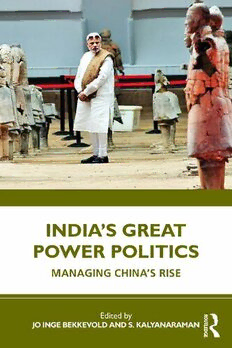
India’s Great Power Politics: Managing China’s Rise PDF
Preview India’s Great Power Politics: Managing China’s Rise
“An excellent volume on the multidimensional relationship between China and India and the emerging patterns of conflict and cooperation between the two rising powers. A must-read for anyone interested in the geopolitics of the Indo- Pacific, past, present and future.” – T.V. Paul, James McGill Professor of International Relations, McGill University, Canada “This examination of Delhi’s long record on balancing and befriending China offers important insights into the making of India’s great power relations.” – C. Raja Mohan, Director, Institute of South Asian Studies, National University of Singapore “A volume of incisive essays, most opportune in the 70th year of the establish- ment of diplomatic ties between India and China.” – Sujan R. Chinoy, Director General, Institute for Defence Studies and Analyses, New Delhi “This is a multi-faceted and very rich compilation of Indian responses to China’s rise, with contributions from leading scholars.” – Jonathan Holslag, Professor of International Politics, Free University of Brussels INDIA’S GREAT POWER POLITICS This book examines India’s foreign and defence policy changes in response to China’s growing economic and military power and increased footprint across the Indo-Pacific. It further explores India’s role in the rivalry between China and the United States. The book looks at the strategic importance of the Indian Ocean Region in the Indo-Pacific geopolitical landscape and how India is managing China’s rise by combining economic cooperation with a wide set of balancing strategies. The authors in this book critically analyse the various tools of Indian foreign policy, including defence posture, security alignments, and soft power diplomacy, among others, and discuss the future trajectory of India’s foreign policy and the factors which will determine the balance of power in the region and the potential risks involved. The book provides detailed insights into the multifaceted and complex relationship between India and China and will be of great interest to researchers and students of international relations, Asian studies, political science, and economics. It will also be useful for policymakers, journalists, and think tanks interested in the India–China relationship. Jo Inge Bekkevold is Senior Adviser at the Norwegian Institute for Defence Studies. He was previously a career diplomat, with several postings to East Asia. S. Kalyanaraman is Research Fellow at the Institute for Defence Studies and Analyses. INDIA’S GREAT POWER POLITICS Managing China’s Rise Edited by Jo Inge Bekkevold and S. Kalyanaraman First published 2021 by Routledge 2 Park Square, Milton Park, Abingdon, Oxon OX14 4RN and by Routledge 52 Vanderbilt Avenue, New York, NY 10017 Routledge is an imprint of the Taylor & Francis Group, an informa business © 2021 selection and editorial matter, Jo Inge Bekkevold and S. Kalyanaraman; individual chapters, the contributors The right of Jo Inge Bekkevold and S. Kalyanaraman to be identified as the authors of the editorial material, and of the authors for their individual chapters, has been asserted in accordance with sections 77 and 78 of the Copyright, Designs and Patents Act 1988. All rights reserved. No part of this book may be reprinted or reproduced or utilised in any form or by any electronic, mechanical, or other means, now known or hereafter invented, including photocopying and recording, or in any information storage or retrieval system, without permission in writing from the publishers. Trademark notice : Product or corporate names may be trademarks or registered trademarks, and are used only for identification and explanation without intent to infringe. British Library Cataloguing-in-Publication Data A catalogue record for this book is available from the British Library Library of Congress Cataloging-in-Publication Data A catalog record for this book has been requested ISBN: 978-0-367-13508-9 (hbk) ISBN: 978-0-367-68286-6 (pbk) ISBN: 978-1-003-13676-7 (ebk) Typeset in Bembo by Apex CoVantage, LLC CONTENTS List of figures ix List of contributors x Acknowledgements xiii PART I India and China’s rise 1 1 India’s great power politics: a framework for analysis 3 J o Inge Bekkevold and S. Kalyanaraman 2 India in China’s grand strategy: change and continuity from 1949 to present 23 Jo Inge Bekkevold 3 India’s response to the China threat since 1949 49 S. Kalyanaraman 4 India’s China policy under Modi: growing co-operation, enduring disagreement, increasing rivalry 75 Sunniva Engh viii Contents PART II China’s rise and India’s neighbourhood policy 101 5 India’s “neighbourhood first” policy and the Chinese challenge: the cases of Bangladesh, Nepal, and Sri Lanka 103 S. D. Muni 6 India and the emerging Sino–Iranian partnership 122 John W. Garver 7 India and the Shanghai Cooperation Organisation 143 P. Stobdan 8 Cultures of pluralism in India’s soft power strategy 160 Constantino Xavier PART III India and the great powers 179 9 India, the United States, and the Indo-Pacific region 181 Jayant Prasad 10 India’s US policy under Modi: alignment and strategic autonomy redefined 208 Harsh V. Pant 11 The changing geopolitical landscape of India–Russia relations 227 P.S. Raghavan 12 India and Japan’s grand bargain in the context of China’s rise 247 Rohan Mukherjee PART IV Concluding observations 263 1 3 Indian strategies on China: past, present, and future 265 J o Inge Bekkevold and S. Kalyanaraman I ndex 276 FIGURES 1.1 India and economic growth in South Asia (GDP, in USD millions) 4 1.2 Global power shift 6 1 .3 The spectrum of balancing, hedging, and bandwagoning 14 2.1 China and India GDP compared 1960–2017 (constant 2010 USD, in billions) 30 6 .1 China–Pakistan and Chabahar Economic Corridors 132 6.2 Advantages in India–China contest for Iran 139 9.1 The geographical span of the Indo-Pacific 186 9.2 The geographic spread of the Indian Ocean, with India’s Andaman and Nicobar Islands 189 9.3 Criss-crossing relationships in the Indo-Pacific 197
